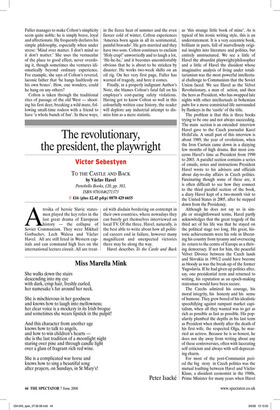The decline of the West
Patrick Skene Catling
THE LEGEND OF COLTON H. BRYANT by Alexandra Fuller Simon & Schuster, £12.99, pp. 203, ISBN 9781847372758 ✆ £10.39 (plus £2.45 p&p) 0870 429 6655 ‘This is a work of non-fiction,’ Alexandra Fuller writes. ‘But I have taken narrative liberties with the text.’ She presents a fictionalised account of the life and early death of one man to personify the tragedy of a whole generation in the modern American West, which is no place for John Wayne heroics. With the force of an emotional novel, this dramatised biography is a polemic against the energy industry’s spoliation of the high plains of Wyoming and the dangerous exploitation of the men who drill there for oil and gas. The book is a panegyric to an austerely beautiful land and a lament for the pioneer cowboys’ descendants, now economically compelled to risk their lives as roughnecks on the oil rigs.
Fuller was born in England in 1969. Three years later, her family moved to a Rhodesian farm, where three siblings died in childhood, accidentally and by natural causes. She says that by the age of six she knew how to handle a submachinegun. In 1994, she and her husband left Zimbabwe and settled in Wyoming. They live there still, with three children. A dustjacket photograph shows her, a lean figure in bush jacket and jeans, standing cheekto-cheek with a horse, its chin resting on her shoulder, and with two dogs at her feet. The landscape reminds her of Africa. She recognises the hardships of making a living in a harsh environment, and the sense of unconfined spaciousness that somehow keeps people there.
Fuller’s depiction of the youth of Colton H. Bryant in and around Evanston, a small town on the Utah border of southwestern Wyoming, is sympathetic, even idealistic in local terms, but not in any sense liberal. With the help of Colton’s family and friends, she portrays his white-blond hair, perennial tan and eyes of ‘a stunning shade of blue,’ but is bound to record that when he is eight years old other boys torment him as ‘a freakin’ retard.’ In fact, he is not so much retarded as impatient. No scholar, he wishes his teacher would lecture twice as fast, so lessons would end twice as soon. Fuller manages to make Colton’s simplicity seem quite noble; he is simply brave, loyal and affectionate. He frequently declares his simple philosophy, especially when under stress: ‘Mind over matter. I don’t mind so it don’t matter.’ She uses the vernacular of the place to good effect, never overdoing it, though sometimes she ventures idiomatically beyond ordinary experience. For example, she says of Colton’s revered, laconic father that ‘he hangs faultlessly on his own bones’. How, one wonders, could he hang on any others?
Colton is taken through the traditional rites of passage of the old West — shooting his first deer, breaking a wild mare, following small-time rodeos with a friend to have ‘a whole bunch of fun’. In these ways, in the fierce heat of summer and the even fiercer cold of winter, Colton experiences ‘America born again in all its sentimental, painful bravado’. He gets married and they have two sons. Colton continues to exclaim ‘Holy crap!’ unworriedly and to laugh a lot, ‘He-he-he,’ and it becomes uncomfortably obvious that he is about to be stricken by disaster. He works two-week shifts on an oil rig. On her very first page, Fuller has warned of tragedy, and here it comes.
Finally, in a properly indignant Author’s Note, she blames Colton’s fatal fall on his employer’s cost-paring safety violations. Having got to know Colton so well in this colourfully written case history, the reader will deplore any industrial attempt to dismiss him as a mere statistic.











































































 Previous page
Previous page